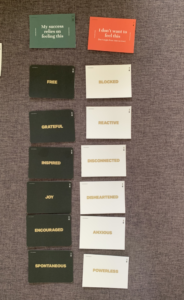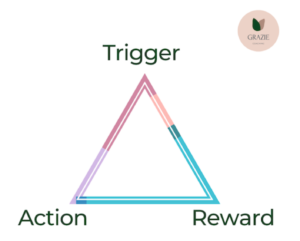In a time-wise ironic old fashion way, I have been marking down daily, my positive streak on the September page of a paper calendar, so before October (and possibly ease in Lockdown restrictions and more temptations!) kicks in, I shall prevent my short term memory-loss of what I have learnt so far by sharing some findings with you all.
Tricks and tips from a career coaching and life coaching perspective
Background information
Habit 1️⃣ was around eating healthier. I’ve lost count of how many times it has now been a goal of mine – Healthy is the new black!
Habit 2️⃣ focused on establishing a new morning routine. Full disclaimer: I am not a morning person. So very not.
As days have gone by, I have noticed a few things worth mentioning.
Your Environment – Inspiring or Expiring You?
John Assaraf phrased it perfectly:
your environment can either inspire you or expire you
The poor Routine no. 2 had no ally in sight for the whole lockdown duration. Most of my household was lucky enough to sleep in: keeping my new routine up while everyone else had the luxury of a few extra hours of sleep has not been inspiring, to say the least. As a matter of fact, it has probably expired my motivation a bit.
🤓 Take away: get yourself an accountability ally!
The Triangle
Neuroscience explains habits as a triangle, where you can change an element with the other 2 adjusting as a consequence. The three aspects to that triangle are: trigger – action – reward.
Goal number 1 had a nuclear bomb 💣 dropped on it: I eliminated the trigger. Goodbye sodas (yip, the tonic in the G&T too, do not judge me!). Adiós crunchy chips. Arrivederci cookies.
I stocked up in healthy snacks (carrots, apples) and promptly sipped a boiling tea right after each meal (that’s when sugar cravings kick in for me).
Furthermore, there’s a pair of trousers I have struggled getting back into. The prospect of potentially having to buy a new wardrobe was not cutting it with me. Yes, admittedly the shopping would have been much fun! Yet I honestly do not believe I would have had the heart (or the credit card coverage) to throw away an entire clothes collection racked up through the years and from around the world.
The plan of attack on Goal number 2, on the other hand, saw a double capitulation. On one hand I set too many actions (4!! Four!! 4️⃣!!) to replace only 1 existing action. I would usually wake up and get on with my day: this, was decided, had to be replaced by a 5min meditation, followed by 6 poses of yoga, followed by 1 page of journalling and finally reinforced by 30min delay in turning my notifications on. On the other hand I didn’t set myself any reward at all: I had absolutely nothing more than a couple of “Pros” listed in my head to keep me going.
Karma decided the 5th day was a perfect day to punish me with tissue tear in my wrist. So 2 of my intended actions became impossible: bye bye yoga and journalling. The other 2 actions collapsed shortly after.
🎁 Take away: do set yourself a reward exciting enough to motivate you!
The deadline
The myth of a habit successfully being formed in only 21 days has long been busted. What neuroscience has also discovered, is that habits tend to actually love the frequency of repetition more than the stretch of days one can maintain them for.
Eating healthy is a choice we face multiple times per day, which (let’s be honest!) can make it an unbearable pain. That’s where my supply choices came in handy: with no sugary products available in the pantry, I forced myself into finally enjoying those once bland carrot sticks.
Habit 2 deadline was somewhat more flexible: as long as the lockdown lasted in Auckland. I was hoping the stretch would be long enough for it to stick around beyond whichever alert-level we were at. With a change of course happening at day 5, I not-so-unconsciously leveraged on that flexibility and, without further ado, declared the experiment over.
🏁 Take away: decide on a fixed deadline (with optionality to extend it!)
Final Thoughts on my Personal Development Coaching Plan
It definitely has been a journey of discovery, and as a coach it has made me more aware of which elements to take into consideration when it comes to habit. Another, wonderful by-product is the fact that I can now relate more to the struggles my clients, friends, colleagues, family go through when trying to establish new routines.
What about you? What is your major take-away when it comes to habit?
Keen to hear your thoughts 📲 , even in a private coaching session (book it here)!
Grazie,
Grazia















